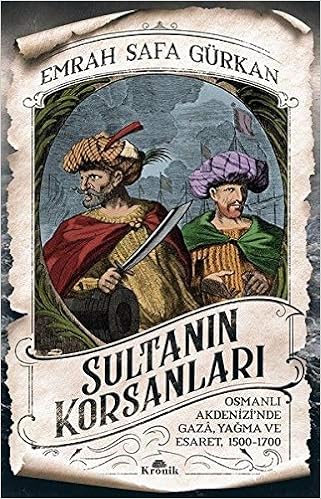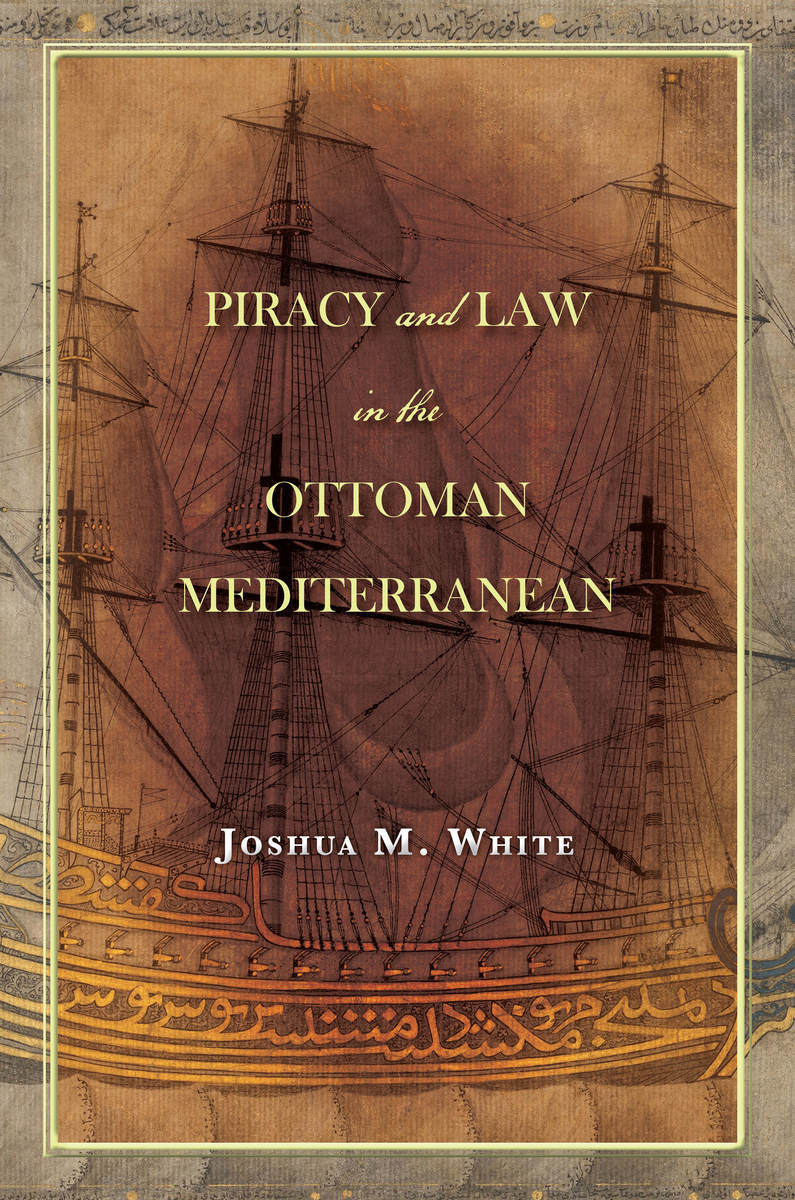The Mediterranean in the Age of Global Piracy
Episode 446
narrated by Chris Gratien
with contributions by Nir Shafir, Taylor Moore, Susanna Ferguson, and Zoe Griffith
with contributions by Nir Shafir, Taylor Moore, Susanna Ferguson, and Zoe Griffith
Feed | iTunes | GooglePlay | SoundCloud
Piracy is often depicted as a facet of the wild, lawless expanses of the high seas. But in this episode, we explore the order that governed piracy, captivity, and ransom in the early modern Mediterranean and in turn, how these practices shaped early modern politics, Mediterranean connections, and the emergent notions of international law. Emrah Safa Gürkan talks about Ottoman corsairs and the practicalities of piracy in the early modern Mediterranean. Joshua White discusses facets of Islamic law and gender in the realm of piracy. And Daniel Hershenzon explores the paradoxical connections forged by slavery, captivity, and ransom on both sides of the Mediterranean.
Stream via SoundCloud
Guests
 |
Emrah Safa Gürkan is currently a faculty member in the Political Science and International Relations Department at 29 Mayıs University in Istanbul. His published books include Sultanın Casusları: 16. Yüzyılda İstihbarat, Sabotaj Ve Rüşvet Ağları, Sultanın Korsanları: Osmanlı Akdenizi'nde Gaza, Yağma ve Esaret, 1500-1700, and Bunu Herkes Bilir: Tarihteki Yanlış Sorulara Doğru Cevaplar. He is co-creator and emeritus host of Ottoman History Podcast.
|
 |
Joshua M. White is Associate Professor of History at the University of Virginia. He is the author of Piracy and Law in the Ottoman Mediterranean (Stanford University Press, 2017). |
 |
Daniel Hershenzon is an Associate Professor in the Department of Literatures, Cultures, and Languages at the University of Connecticut. His book, The Captive Sea: Slavery, Communication, and Commerce in Early Modern Spain and the Mediterranean (University of Pennsylvania Press, 2018), has been awarded the ASPHS 2019 Best First Book in Iberian History Prize, and the University of Connecticut Humanities Institute Sharon Harris prize. Hershenzon is currently the Sir John Elliott Fellow at the Princeton Institute for Advanced Studies, where he is working on his new book project, Captive Objects: Religious Artifacts, Piracy, and Slavery in the Early Modern Mediterranean. |
Hosts
 |
Chris Gratien is Assistant Professor of History at University of Virginia, where he teaches classes on global environmental history and the Middle East. He is currently preparing a monograph about the environmental history of the Cilicia region of the former Ottoman Empire from the 1850s until the 1950s. |
 |
Nir Shafir researches the intellectual and religious history of the Middle East, from roughly 1400-1800, focusing on material culture and the history of science and technology. He is an assistant professor of history at UCSD and one of the producers of the Ottoman History Podcast. |
 |
Taylor M. Moore is a PhD Candidate in Modern Middle Eastern History at Rutgers University, New Brunswick. She is interested in the interconnected histories of medicine, magic, and ethnographic museums in late nineteenth and early twentieth century Egypt. |
 |
Susanna Ferguson completed her Ph.D. in 2019 at Columbia University. Her work focuses on the conceptual and social history of education, gender, and democracy in Egypt and Lebanon. She is currently a postdoctoral fellow at the Harvard Academy for International and Area studies. |
 |
Zoe Griffith is Assistant Professor of History at Baruch College, CUNY and completed her Ph.D. at Brown University in 2017. Her research focuses on political economy, law, and governance in the Ottoman Arab provinces from the 17th to the 19th centuries. She records mainly in New York City. |
Credits
Episode No. 446
Release Date: 28 January 2019
Recording Locations: Cihangir, Istanbul; Burgazada, Istanbul; Chicago
Music: Chad Crouch - Pilgrims Progress, Skatepark, Lilac; Soft and Furious - So What; Pictures of the Floating World - Waves; Kai Engel - Illumination; TRG Banks - Across the Mountainous Region
Audio production by Chris Gratien
Release Date: 28 January 2019
Recording Locations: Cihangir, Istanbul; Burgazada, Istanbul; Chicago
Music: Chad Crouch - Pilgrims Progress, Skatepark, Lilac; Soft and Furious - So What; Pictures of the Floating World - Waves; Kai Engel - Illumination; TRG Banks - Across the Mountainous Region
Audio production by Chris Gratien
Further Listening
Further Reading
Antony, Robert J. Like Froth Floating on the Sea: The World of Pirates and Seafarers in Late Imperial South China. Berkeley: Institute of East Asian Studies, 2003.
Antony, Robert. Pirates in the Age of Sail. New York, 2007.
Bolster, W. Jeffrey. Black Jacks: African American Seamen in the Age of Sail. Cambridge: Harvard University Press.
Bracewell, Catherine Wendy. The Uskoks of Senj: Piracy, Banditry, and Holy War in the Sixteenth-Century Adriatic. Ithaca: Cornell University Press, 1994.
Bradford, Ernle. The Sultan’s Admiral: Barbarossa-Pirate and Empire Builder. New York: Tauris Parke, 2009, ilk baskı: Hodder & Stoughton, 1969.
Capponi, Niccolò. Victory of the West: The Great Christian-Muslim Clash at the Battle of Lepanto. Cambridge, MA: Da Capo Press, 2007.
Cordingly, David. Life among the Pirates: The Romance and the Reality. London: Little, Born, 1995.
Davis, Robert C. Christian Slaves, Muslim Masters: White Slavery in the Mediterranean, the Barbary Coast and Italy, 1500-1800. New York: Palgrave Macmillan, 2003.
Duncombe, Laura Sook. Pirate Women: The Princesses, Prostitutes, and Privateers Who Ruled the Seven Seas. Chicago: Chicago Review Press, 2017.
Dursteler, Eric. Renegade Women: Gender, Identity, and Boundaries in the Early Modern Mediterranean. Baltimore: The Johns Hopkins University Press, 2011.
Friedman, Ellen G. Spanish Captives in North Africa in the Early Modern Age. Wisconsin: The University of Wisconsin Press, 1983.
Garcés, María Antonia. Cervantes in Algiers: A Captive’s Tale. Nashville: Vanderbilt University Press, 2002.
Gauci, Liam. In the Name of the Prince: Maltese Corsairs, 1760-1798. Malta: Heritage Malta, 2016.
Glete, Jan. War and the State in Early Modern Europe: Spain, the Dutch Republic and Sweden as Fiscal-Military States, 1500-1660. London and New York: Routledge, 2002.
Graf, Tobias P. The Sultan’s Renegades: Christian-European Converts to Islam and the Making of the Ottoman Elite, 1575-1610. Oxford: Oxford University Press, 2017.
Greene, Molly. Catholic Pirates and Greek Merchants: A Maritime History of Early Modern Mediterranean. Princeton: Princeton University Press, 2010.
Heller-Roazen, Daniel. The Enemy of All: Piracy and the Law of Nations. New York: Zone Books, 2009.
Horden, Peregrine ve Nicholas Purcell. The Corrupting Sea: A Study of Mediterranean History. Oxford: Blackwell, 2000.
Krstič, Tijana. Contested Conversions to Islam: Narratives of Religious Change in the Early Modern Ottoman Empire. Stanford: Stanford University Press, 2011.
Leeson, Peter T. The Invisible Hook: The Hidden Economics of Pirates. Princeton and Oxford: Princeton University Press, 2009.
Lloyd, Christopher. English Corsairs on the Barbary Coast. London: Collins, 1981.
Lunsford, Virginia W. Piracy and Privateering in the Golden Age Netherlands. New York: Palgrave MacMillan, 2005.
Malcolm, Noel. Agents of Empire: Knights, Corsairs, Jesuits and Spies in the Sixteenth-Century Mediterranean World. London: Allen Lane, 2015.
Moalla, Asma. The Regency of Tunis and the Ottoman Porte, 1777-1814: Army and Government of a North-African Ottoman Eyâlet at the End of the Eighteenth Century. London: Routledge, 2004.
Panzac, Daniel. Barbary Corsairs: The End of a Legend, 1800-1820. Leiden and Boston: Brill, 2005.
Rediker, Marcus. Villains of All Nations: Atlantic Pirates in the Golden Age. London ve New York: Verso, 2012.
Tabak, Faruk. The Waning of the Mediterranean, 1550-1870: A Geohistorical Approach. Baltimore: Johns Hopkins University Press, 2008.
Tinniswood, Adrian. Pirates of Barbary: Corsairs, Conquests and Captivity in the Seventeenth-Century Mediterranean. New York : Riverhead Books, 2010.
Tucker, Judith E., Osama Abi-Mershed, Edmund Burke, Julia Ann Clancy-Smith, William Granara, N. I. Matar, and Joshua M. White. The Making of the Modern Mediterranean: Views from the South. 2019.
Benton, Lauren. “Legal Spaces of Empire: Piracy and the Origins of Ocean Regionalism.” Comparative Studies in Society and History 47, no. 4 (2005): 700–724.
Bostan, İdris. Adriyatik’te Korsanlık: Osmanlılar, Uskoklar, Venedikliler, 1575–1620. Istanbul: Timaş, 2009.
Braudel, Fernand. The Mediterranean and the Mediterranean World in the Age of Philip II. Translated by Sian Reynolds. 2 vols. New York: Harper, 1972.
Brummett, Palmira. Ottoman Seapower and Levantine Diplomacy in the Age of Discovery. Albany: State University of New York Press, 1994.
Fodor, Pál. “Piracy, Ransom Slavery and Trade: French Participation in the Liberation of Ottoman Slaves from Malta during the 1620s.” Turcica 33 (2001): 119–134.
Fusaro, Maria, Colin Heywood, and Mohamed-Salah Omri, eds. Trade and Cultural Exchange in the Early Modern Mediterranean: Braudel’s Maritime Legacy. London: I. B. Tauris, 2010.
Ginio, Eyal. “Piracy and Redemption in the Aegean Sea during the First Half of the Eighteenth Century.” Turcica 33 (2001): 135–147.
Graf, Tobias, Christian Roth, Gülay Tulasoğlu, and Pascal Firges, eds. Well-Connected Domains. Leiden: Brill, 2014
Gürkan, Emrah Safa. “The Centre and the Frontier: Ottoman Cooperation with the North African Corsairs in the Sixteenth Century.” Turkish Historical Review 1, no. 2 (2010): 125–163.
Heywood, Colin. “Ottoman Territoriality versus Maritime Usage.” In Insularités Ottomanes, edited by Nicolas Vatin and Gilles Veinstein, 145–173. Paris: Maisonneuve & Larose, 2004.
Sobers-Khan, Nur. Slaves without Shackles: Forced Labour and Manumission in the Galata Court Registers, 1560–1572. Berlin: Klaus Schwarz Verlag, 2014.
Talbot, Michael. “Protecting the Mediterranean: Ottoman Responses to Maritime Violence, 1718–1770.” Journal of Early Modern History 21, no. 4 (2017): 283–317.
Theunissen, Hans. “Ottoman-Venetian Diplomatics: The Ahd-names. The Historical Background and the Development of a Category of Political-Commercial Instruments Together with an Annotated Edition of a Corpus of Relevant Documents.” Electronic Journal of Oriental Studies 1, no. 2 (1998): 1–698.
van den Boogert, Maurits H. “Redress for Ottoman Victims of European Privateering: A Case against the Dutch in the Divan-ı Hümayun (1708–1715).” Turcica 33 (2001): 91–118.
Vatin, Nicolas. “Une affaire interne: Le sort et la libération des personnes de condition libre illégalement retenues en esclavage sur le territoire ottoman (XVIe siècle).” Turcica 33 (2001): 149–190.
Weiss, Gillian. Captives and Corsairs: France and Slavery in the Early Modern Mediterranean. Stanford, CA: Stanford University Press, 2011.
Zachariadou, Elizabeth, ed. The Kapudan Pasha: His Office and His Domain: Halcyon Days in Crete IV, a Symposium Held in Rethymnon, 7–9 January 2000. Rethymnon: University of Crete Press, 2002.














Comments
Post a Comment
Due to an overwhelming amount of spam, we no longer read comments submitted to the blog.